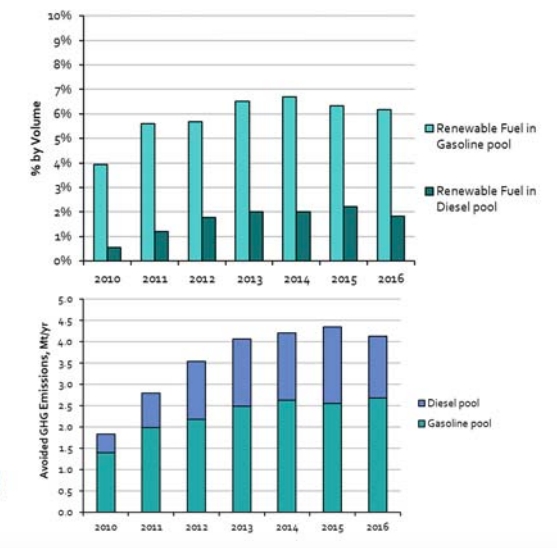
Biofuels in Canada report expands coverage of biofuel use
July 24, 2018
By Advanced Biofuels Canada
July 24, 2018 - Advanced Biofuels Canada (ABFC) announced the release of the Biofuels in Canada (BIC) 2018 report, which updates and expands upon the last annual report by Navius Research.

“Data about our industry has become even more important as biofuels’ role in meeting federal Clean Fuel Standard targets becomes evident. Provincial work to update renewable and low carbon fuel policies also continues. These annual reports have become increasingly comprehensive to stay relevant in the very dynamic Canadian fuels and carbon pricing arena,” said Ian Thomson, president ABFC.
The updated report catalogs biofuel blending rates, biofuel types, and feedstocks utilized at the provincial level. Greenhouse gas (GHG) reductions are assessed annually by fuel type, with estimates of biofuels impact on consumer fuel expenditures, GHG abatement costs, and the impact of taxation policies on lower carbon fuels.
Amongst the study’s highlights:
- Ethanol consumption has increased from roughly 1,700 million liters in 2010 to 2,850 million liters in 2016, accounting for over 6% of fuel consumption in the gasoline pool. Renewable fuel consumption in the diesel pool was 540 million liters in 2016, accounting for roughly 2% of diesel fuel consumption.
- Annual avoided lifecycle GHG emissions resulting from biofuel consumption were 4.1 Mt/yr in 2016, a slight step backwards from 2015.
- Biofuel consumption reduced fuel expenditures in Canada by 0.26% from 2010 to 2016, relative to a counterfactual scenario of no biofuel blending.
- The cost impact is equivalent to an average $16/yr savings for an archetypal gasoline consumer (i.e. private light‐duty vehicle) or an additional cost of $223/yr for an archetypal diesel consumer (i.e. a long‐haul trucker).
The report continued to highlight the need for a government review of taxation on biofuels. As biofuels generally have lower energy densities than gasoline and diesel, volumetric fuel taxes (e.g., excise, carbon) on biofuels unnecessarily increase fuel costs for consumers and create windfall tax revenues for governments. Governments should align fuel taxation policies to meet transport and climate goals by supporting increased use of low carbon advanced biofuels.
The full report and data tables are available at: advancedbiofuels.ca/biofuelscanada2018/
Print this page